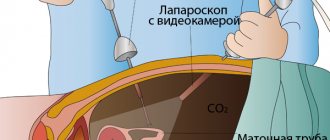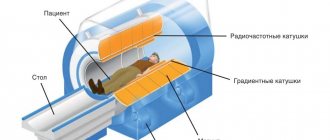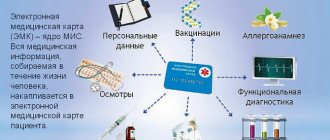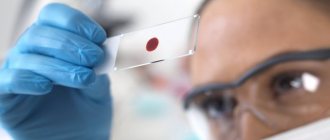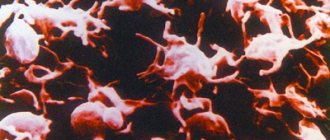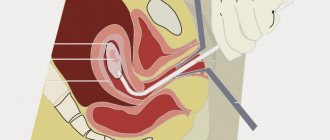FGDS or fibrogastroduodenoscopy is an endoscopic method for diagnosing gastrointestinal diseases. Access to the organs is carried out through the oral cavity: the doctor inserts a gastroscope tube into the esophagus and advances it into the stomach and duodenum, examining the mucous membranes.
Approximately 80% of patients who have undergone such an examination complain that they have a sore throat after FGDS and other symptoms reminiscent of a sore throat. Is this normal, and what should you do if you have pain when swallowing and when you try to speak or cough? This article will tell you about this and much more.
The process of conducting FGDS
The entire procedure takes approximately 10 minutes. Only if it is necessary to take material for a biopsy, more time is required.
The procedure is as follows:
- The patient lies on his side.
- The healthcare provider treats the throat with a numbing drug to reduce sensitivity (for example, lidocaine).
- A mouthpiece is placed in the patient's mouth and a probe is inserted through it.
- An endoscopist examines the condition of the stomach based on information transmitted by the camera to the screen.
Possible complications
With this method of research, the root part of the tongue is affected. This causes a gag reflex. Sometimes after the procedure your stomach or throat may hurt. Experts consider such manifestations to be a completely normal reaction of the body to the insertion of a probe.
But what to do if the throat pain does not subside for several days? In this case, you should consult an otolaryngologist.
Equipment for FGDS can damage some internal organs:
- walls of the esophagus;
- the inner lining of the stomach;
- surface of the upper intestine.
Among the most common complications after the FGDS procedure:
- mechanical injury to organ walls;
- pneumonia;
- perforation of the wall of the stomach or esophagus;
- laryngotracheitis, as a result of mechanical injury;
- During the procedure, the rhythm of heart contractions is disrupted.
If the procedure was carried out in violation of sanitary standards, then pathogenic infections may enter the intestines.
If a patient develops a gag reflex during FGDS, stomach contents may enter the lungs, which can cause pneumonia.
See also
How and with what to treat a sore throat quickly at home
Read
Useful tips
Since mild and short-term discomfort in the throat after gastroscopy is considered normal, there is no need to panic and swallow all kinds of medications. Also, the probe touches the stomach muscles when taking samples for research, mucous membranes are taken for analysis and contact between the tube and internal organs simply occurs; pain can be difficult to avoid. Follow some simple tips that your doctor will tell you in detail.
This will avoid complications if your stomach or throat hurts.
- Gastroscopy is considered a safe procedure. Therefore, it is recommended to eliminate the consequences in the form of pain without the use of medications.
- If unpleasant symptoms in the oral cavity and larynx intensify, the doctor should prescribe a course of drug treatment.
- The main treatment is antiseptic gargling. In addition to pharmaceutical Chlorhyxedine, Furacilin and Miramistin, many doctors advise using regular baking soda. It is diluted in warm water and the mouth is rinsed 3-5 times a day. This remedy helps to change the acidity in the throat, due to which all pathogenic and potentially threatening microorganisms actively die. The risk of getting sick is minimized. But it is important to rinse your mouth regularly and not stop until the full course of treatment has been completed.
- In addition to soda or as an independent remedy, throat lozenges are used to soften the throat and restore the mucous membrane. The soreness is eliminated and the patient feels relief within a few hours.
- If your throat continues to hurt and dryness is actively manifested, eat 1 small spoon of sea buckthorn oil before meals. Its enveloping properties will relieve dryness and help eliminate discomfort.
- Honey is a good folk remedy, which doctors themselves recognize. But you need to take only high-quality honey, dissolving it in your mouth. It is recommended to do this before bed and before each meal. If you are allergic to this product, you should not use it for treatment.
- Eat right. You should not eat any solid foods, fried, salted, smoked, spicy, sour, etc. Choose food that is as soft and light as possible. Spicy foods are considered the most dangerous for the stomach and throat after gastroscopy. The temperature should be average. Too hot or very cold food can aggravate your condition.
Is it possible to do FGDS if your throat hurts?
Before FGDS, some patients ask whether the procedure can be performed if they have a sore throat or there are signs of a cold. A significant contraindication for this procedure is nasal congestion and runny nose, as this will negatively affect the respiratory process. With such symptoms, it is better to postpone FGDS to a later time or use vasoconstrictor drops. Their use will ensure breathing through the nose.
You should definitely refuse to examine the stomach with a probe in case of pharyngitis, laryngitis, or tracheitis. These diseases are characterized by inflammation of the throat mucosa. The pharynx at this time has increased sensitivity to irritating factors. Touching it with a fiberscope can aggravate the inflammatory reaction, and sometimes cause a spasm that impairs breathing.
Do I need to see a doctor?
If your throat hurts after FGDS within 24 hours, this is considered normal. In some cases, after this time, the discomfort does not stop. By their intensity you can judge how badly the tissue is damaged. With a minor injury, the sore throat after gastroscopy goes away on its own on the second day.
More serious damage is accompanied by unpleasant sensations for 2-4 days. A gradual increase in symptoms indicates infection of the wound and the onset of the inflammatory process; one of the serious complications develops - sore throat. Thus, if unpleasant symptoms do not go away within 2-4 days and intensify, you should consult a doctor.
After conducting an FGDS, a number of general recommendations should be followed. Within 3 hours, the damaged mucous membrane is restored, so during this time you should abstain from food. On the first day, spicy, fatty, salty foods and smoked foods are completely excluded from the diet.
In addition, it is necessary to monitor the temperature of the food; too hot dishes are prohibited. Food should be warm and soft, preferably ground. Warm liquid soothes irritated mucous membranes, but strong tea and coffee are not recommended. In the first days after FGDS, you should eat porridge and stewed vegetables. Rough, heavy food additionally injures the mucous membrane of the pharynx.
A damaged throat after fibrogastroduodenoscopy is susceptible to various infectious agents. Patients should be careful; they should limit their stay in crowded places, especially during the period of epidemic rise in incidence.
If your throat hurts after an FGDS, you can reduce the traumatic effect of food on the irritated mucous membrane. To do this, immediately before meals you should take a teaspoon of vegetable oil (sea buckthorn, flaxseed or olive). This not only improves the sliding of food, but also promotes tissue regeneration.
The following agents have shown high effectiveness in healing microdamages of the mucous membrane of the throat:
- chlorheskidine prevents wound infection and suppresses unpleasant symptoms; for the treatment of throat diseases, the recommended dosage is 0.05, so it is more convenient to immediately purchase a product of this concentration, otherwise you should dilute it with boiled water;
- Chlorophyllite in the form of a spray reduces inflammatory processes and inhibits the growth of bacteria;
- Miramistin spray destroys bacteria and reduces inflammation;
- Furacilin has an antiseptic effect, 1-2 tablets should be crushed, dissolved in a glass of warm boiled water and preferably strained through gauze, after which you can gargle;
- Inhalipt aerosol reduces pain;
- milk with honey soothes an irritated throat;
- Chamomile infusion and other herbal teas suppress inflammation and suppress pain.
Fibrogastroduodenoscopy performed by a specialist rarely causes any complications. However, the success and safety of the procedure also depends on the patient. If he does not follow the recommendations, damage to the mucous membrane is inevitable. Microtraumas may be accompanied by pain, which goes away on its own. If discomfort bothers the patient for more than 2 days, it is necessary to consult a doctor.
Author: Ksenia Khazieva, doctor, especially for Moizhivot.ru
Ways to relieve pain
If pain occurs after an FGDS study, gastroenterologists advise waiting for a while, since in most cases they go away without any intervention. If you have a sore throat, it is recommended to gargle frequently (about every hour). But if such recommendations do not help, and the pain bothers you for a long time, then you need to consult a doctor.
It is recommended to treat the throat with gargles. The following agents and preparations can be used as an antiseptic:
- Aqueous solution of Furacilin.
- A solution of soda, salt and iodine in warm water. For 1 glass of water, 2-3 drops of iodine and 0.5 tsp. soda and salt.
- Pharmacy spray Chlorophyllipt. In addition to relieving pain, it stops the inflammatory process.
- Inhalipt is used to eliminate pain.
- A mixture of milk and honey (1 teaspoon of honey per 250 ml of warm milk).
- Chamomile decoction.
- Pain relievers with the addition of zinc gluconate.
In these ways, you can speed up the healing process of the throat after examining the stomach using FGDS. If your throat hurts after gastroscopy, bee honey helps heal minor injuries on the throat. It can be consumed as usual without dissolving in water. Also good results come from tea with the addition of milk and natural honey.
Pharmacy products
The drug Kameton has a good effect. It eliminates pain when swallowing and has not only an analgesic effect, but also an anti-inflammatory and antiseptic effect. The unpleasant sensation in the throat is relieved by the menthol included in it.
See also
Symptoms and treatment of chronic and acute catarrhal laryngitis in adults
Read
A popular remedy is Orasept. The pain goes away within a few minutes after irrigating the mouth. This drug also relieves the inflammatory process.
It is recommended to purchase the drug TeraFlu Lar at the pharmacy. It contains lidocaine, which has an anesthetic effect. For some time it helps relieve pain.
In addition to sprays, tablets intended for resorption are used to quickly eliminate the unpleasant consequences of FGDS. Both adults and children can use Grammidin Neo lozenges with anesthetic.
Chlorhexidine rinse is used as follows. First, rinse your throat with regular warm water. Then pour 1 tbsp into the oral cavity. l. the drug and rinse for 30 seconds. It is not advisable to eat or drink water for 1 hour after rinsing. Rinse with Chlorhexidine 3 times a day.
Recommendations
Most often, people are interested in what to do if their stomach hurts after gastroscopy. The following recommendations have been developed on this issue:
- In almost all cases, discomfort does not require any drug treatment;
- If the pain does not relieve itself on its own, it intensifies or becomes cramping in nature, you should immediately consult a doctor;
- Minor pain can be relieved with a gentle diet for the first few days after FGDS;
- In case of inflammatory changes in the oral cavity, antiseptics are first prescribed:
- "Chlorhexidine";
- "Furacilin";
- "Miramistin";
- Saline solutions;
- An increase in body temperature, the development of intoxication, the appearance of cough and shortness of breath indicates an inflammatory process of the upper respiratory tract (pneumonia, bronchitis, tracheitis). In this case, the doctor may prescribe antibacterial drugs or even hospitalize the patient.
If pain persists, self-medication is strictly prohibited. In order not to miss a serious complication that requires timely surgical intervention, you must immediately consult a doctor.
The consequences of gastroscopy can be pain affecting the throat and stomach. If they are minor, then there is no cause for concern. Usually the discomfort goes away on its own. This takes from several hours to 1 – 2 days. But when the pain in the throat or stomach intensifies, the discomfort is felt serious, such symptoms cannot be ignored. You should definitely consult your doctor to determine if there are any injuries or complications after the procedure.
Minor and short-term pain in the throat or stomach after FGDS is considered normal.
Cause of sore throat after FGDS
Gastroenterologists have to listen to complaints of pain from almost all patients who have had their stomach examined using a tube. This occurs primarily due to mechanical trauma to the walls of the pharynx during the advancement of the probe. Also, due to the gag reflex, bile is released into the throat, which leads to irritation of the walls. Usually, unpleasant pain goes away 1–2 days after the procedure.
To reduce the level of unfavorable condition of the throat walls after FGDS, it is not recommended to eat hot foods, as well as spicy and sour foods, which can create an additional irritating effect.
Causes of pain syndrome
If your stomach hurts after an FGDS, the doctor needs to quickly establish the exact cause in order to decide what to do next. In most cases, this is considered a variant of the norm, and the discomfort goes away on its own within a few hours or days, without requiring additional action.
The main cause of stomach pain is quite trivial - stretching of the stomach walls when air is pumped. Such an event is necessary to smooth out the folds of the mucous membrane for better visualization.
Such consequences may be combined with temporary belching, heartburn or bloating, which do not cause significant harm to health.
The cause of the condition in which the stomach hurts after FGDS may be much more serious. This happens both due to errors in the procedure technique, and through the fault of the patient himself, if he did not follow the doctor’s instructions or behaved excitedly. Taking into account risk factors and these points, the following reasons for the development of complications that may cause stomach pain are identified:
- The doctor injured the walls of the stomach, esophagus or nearby organs with a gastroscope or additional instruments;
- In addition to pain, this is fraught with a rapid increase in bleeding, the development of peritonitis and shock if there was a complete perforation of the hollow organ (perforation);
- Secondary infection of ulcers, injured polyps or tonsils (angina). This reason is usually relevant for the long-term period after gastroscopy, although it is extremely rare due to the strict rules of asepsis and antisepsis in the diagnostic room.
Preparation for the procedure
Doctors recommend preparing in advance for the FGDS examination procedure. This reduces possible unforeseen situations. First of all, such a patient needs to prepare himself psycho-emotionally.
Also, before going for an examination, you should avoid fatty, hot or spicy foods. This may make the procedure difficult.
The last meal before the examination should be no earlier than 8–10 hours. The menu should consist only of light foods. It is also forbidden to drink water. A few sips can be taken no later than 3 hours before FGDS.
A patient who is prescribed a course of medications is recommended to consult with his doctor about temporarily stopping their use. As a rule, taking medications complicates this procedure, so it is better if you do not take them the day before the procedure. Drinking alcoholic beverages and smoking is not advisable.
What to do: general tips
The first and most important advice on what to do when your throat hurts after a gastroscopy is not to ignore this symptom. It is important to minimize the likelihood of additional injury and irritation of the mucous membrane. To do this, in the first 2-3 days after FGDS, sour and spicy foods should be excluded, foods with solid particles, carbonated drinks and alcohol should be removed from the diet. To make it less painful to swallow food, on the first day after gastroscopy you need to eat pureed dishes, purees and broths.
Important! The food temperature before the mucous membranes are restored after gastroscopy should not exceed 40-50 degrees. Cold foods and drinks should also be avoided.
To reduce irritation before eating, you can drink a tablespoon of oil: sea buckthorn, olive or flaxseed. They have an enveloping, soothing and healing effect, so their use will speed up recovery from gastroscopy and prevent complications.
If FGDS results in prolonged pain that does not subside, and swallowing becomes more difficult every day, you need to make an appointment with a doctor to examine the throat and larynx for inflammation. If there are no additional symptoms, you can visit an ENT doctor, and if a cough with blood discharge appears, you should contact the gastroenterologist who issued the referral for FGDS, or the endoscopist who conducted the study.

